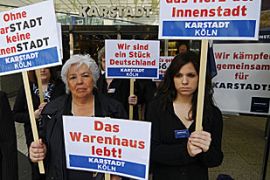Germany’s Arcandor faces bankruptcy
About 43,000 jobs at risk as Berlin refuses emergency aid to retail and tourism giant.

Rival interest
Horst Piepenburg, Arcandor’s appointed bankruptcy manager, said it would be the “biggest insolvency currently under way in Germany”.
Arcandor said Thomas Cook, the travel agency in which Arcandor holds a 52 per cent stake “will remain unaffected by the insolvency proceedings”.
Karl-Gerhard Eick, the chairman of Arcandor’s board, said: “Even as the insolvency proceedings are ongoing, we will continue to fight to save as many jobs and locations as possible.”
Eick said the bankruptcy was inevitable given the company’s lack of funds and that he did not blame the political establishment for his firm’s plight.
Metro, which employs 300,000 people in 32 countries across Europe, Asia and Africa, quickly expressed an interest in taking over its stricken rival.
In a statement, Metro said: “We remain, as before, committed to our proposal of taking over some 60 Karstadt sites and thereby saving the majority of jobs. The door for talks and negotiations is open.”
Last chance
The government rejected the company’s request for $902m in state loan guarantees and $614m in emergency loans a day earlier, but gave the firm one last chance to submit an improved bid.
But, following an emergency meeting, the firm’s board said it could no longer raise funds after the government rejected its initial plea for help.
Arcandor’s statement said: “Given the fact that loans in the amount of 710 million euros [$1bn] will shortly become due, the company will be threatened with insolvency as of 12 June 2009.”
The German government’s decision not to intervene to save the firm followed its efforts two weeks ago to keep carmaker Opel and its 25,000 workers afloat with billions of dollars in aid.
‘Special case’
Merkel said that Opel represented a “special case” and that Arcandor had already been in trouble before the global recession.
To qualify for funds from the “Germany Fund” set up by the government to help companies suffering in the economic crisis, firms must prove they were healthy before the financial crisis and have a solid plan for the future.
Merkel said: “We also have to pay attention to the taxpayers and so I think insolvency is an unavoidable step that should however be used as an opportunity.”
Official statistics released on Tuesday showed German exports continued to plummet in April.
The country’s exports plunged by 28.7 per cent in April from the same month a year earlier, as German struggled with its worst recession since World War II.